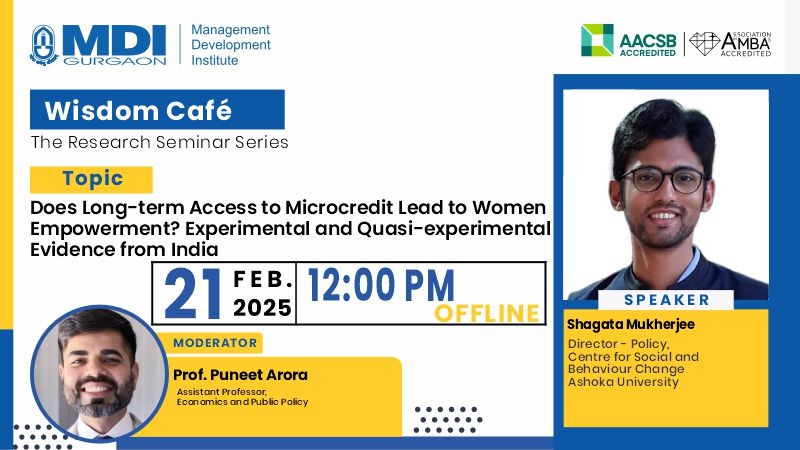
February 21, 2025 | 12:00 PM
MDI Gurgaon is delighted to host Dr. Shagata Mukherjee, Director-Policy, Centre for Social & Behaviour Change for an insightful session on “Does Long-term Access to Microcredit Lead to Women Empowerment? Experimental and Quasi-experimental Evidence from India".
Date: 21st Feb 2025 (Friday)
Time: 12.00 PM IST
Mode: Offline
Abstract - In this paper, we examine the impact of long-term access to microcredit on women’s intra-household bargaining power and consequently women’s empowerment and poverty alleviation. Our hypothesis is that whether long-term access to microcredit leads to women’s empowerment crucially depends on whether there is an improvement in their intra-household bargaining power or not. We adopt a quasi-experimental methodology involving a statistical matching technique to identify the impact of long-term access to microcredit on women empowerment. In partnership with an India based financial service provider, we match comparable long-term and new female microfinance clients using coarsened exact matching. We also conduct behavioural experiments with the female clients and their spouses to assess the relative intra-household bargaining power of women as a potential mechanism for women empowerment. We find that long-term access to microcredit does not improve women’s intra-household bargaining power and consequently does not have any significant impact on women’s empowerment. We also find no significant improvement for the long-term microfinance female clients on parameters such as likelihood of being self-employed, engaging in paid work, and influence over borrowing decisions. Finally, we do not find any significant positive downstream effects of long-term access to microcredit, measured using a multi-dimensional poverty index. We attribute these results to our potential mechanism of women’s intra-household bargaining power as household development outcomes improve significantly when women are in control of household resource allocation.
The session will be moderated by Prof. Puneet Arora Assistant Professor, Economics & Public Policy MDI Gurgaon.